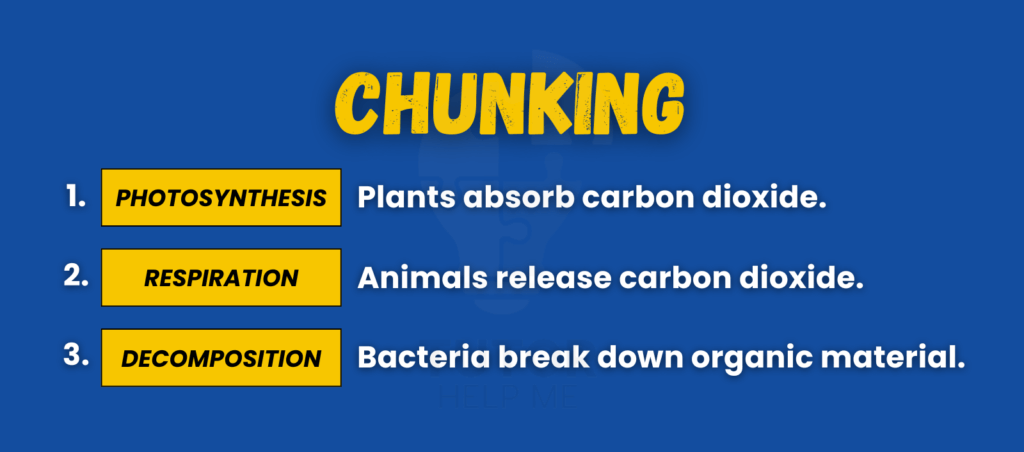Learning biology terms is important for understanding scientific concepts. These terms explain processes like respiration, photosynthesis, and ecosystems. In GCSE and A-Level biology, students need to memorise biology terms to answer exam questions correctly.
Knowing biological terms helps students connect different topics, making it easier to understand complex material. Effective memorisation not only helps in exams but also builds a strong foundation for future studies in science.
What challenges do students face in learning biology definitions?
Many students struggle with memorising biology terms because:
- The terms are often difficult and based on Latin words.
- Some words sound similar, making them easy to confuse.
- There is a lot of new material to remember.
- A lack of memory aids makes it harder to recall terms during an exam.
For example, students may confuse tissue with cell structures or struggle to remember the different stages in a biological cycle.
How can effective memorisation techniques improve exam performance?
Using the right strategy makes it easier to remember terms. Methods like mnemonics, flashcards, and mind maps help simplify learning. Creating a diagram to show connections between terms also improves memory retention.
With structured study techniques, students can understand biology rather than just memorising definitions. This improves recall during exams and strengthens overall knowledge.
Best Techniques to Memorise Biology Terms
Biology has many complex terms, but structured learning helps in long-term retention. The best ways to memorise biology terms include:
- Using flashcards for quick recall.
- Applying mnemonics to simplify information.
- Creating mind maps to organise ideas visually.
- Using chunking to break down large concepts.
- Linking terms to real-life associations.
Each method strengthens memory retention and improves understanding.
Flashcards: How Can Flashcards Improve Memory Retention?
Flashcards help with active recall, making it easier to remember biology terms.
How to Use Flashcards Effectively:
- Write the term on one side and the definition on the other.
- Add an image or diagram to reinforce understanding.
- Use digital flashcards like Quizlet for spaced repetition.
Example:
- Term: Photosynthesis
- Definition: The process where plants use carbon dioxide, oxygen, and sunlight to produce energy.
Reviewing flashcards regularly strengthens memory and improves exam performance.

Mnemonics and Acronyms: How Do They Help in Learning Biology?
Mnemonic devices help simplify scientific words by forming patterns or phrases.
Example Mnemonic for Taxonomy:
- King Philip Came Over For Good Soup
(Kingdom, Phylum, Class, Order, Family, Genus, Species)
How Mnemonics Help:
- They create simple associations to aid recall.
- They make complex terms easier to remember.
Using mnemonics, students can learn biological terms more efficiently.

Mind Maps: How Do Visual Connections Aid Memorisation?
A mind map connects different biological terms, helping students understand relationships between concepts.
Steps to Create a Mind Map:
- Write the main biology term in the centre.
- Branch out related terms and concepts.
- Add images and diagrams to strengthen learning.
Example:
For the respiratory system, a mind map can link oxygen, tissues, and respiration.
This method makes complex topics easier to understand and recall.

Chunking: How Does Breaking Information into Smaller Parts Make Learning Easier?
Chunking divides new material into smaller, manageable sections.
How to Use Chunking in Biology:
- Group related biology terms together.
- Break long definitions into key points.
- Use memory aids like tables or diagrams.
Example:
Instead of memorising the carbon cycle as a whole, break it into:
- Photosynthesis – Plants absorb carbon dioxide.
- Respiration – Animals release carbon dioxide.
- Decomposition – Bacteria break down organic material.
Chunking makes complex terms easier to process and remember.

Association Techniques: How Can Linking Terms to Real-Life Examples Boost Memory?
Connecting biology terms to everyday experiences helps students understand and memorise them better.
How to Use Associations:
- Link terms to real-world examples.
- Relate scientific concepts to common experiences.
- Use visual learning aids like diagrams or videos.
Example:
- Oxygen is essential for respiration, just like fuel powers a car.
- Tissues are like building blocks that make up the body.
This approach improves long-term retention.
Active Learning Strategies for Biology
Using active learning keeps students engaged and improves recall.
How Does Teaching Someone Else Improve Recall?
Explaining biology terms to others reinforces understanding. Teaching helps students:
- Break down complex ideas into simple terms.
- Use memory aids like diagrams and examples.
- Improve recall by engaging with the material.
Example:
If a student explains the respiratory system to a friend, they reinforce their own understanding.
What is the Feynman Technique, and How Does It Help with Biology?
The Feynman Technique simplifies complex biology concepts by:
- Choosing a biology term to explain.
- Writing a simple explanation in everyday words.
- Identifying gaps in understanding and revising them.
- Repeating the process until the concept is clear.
Example:
- Instead of memorising “Mitochondria is the powerhouse of the cell,” say:
- “Mitochondria create energy like a battery powers a phone.”
This method makes biological terms easier to recall.
How Do Quizzes and Practice Tests Strengthen Memorisation?
Taking quizzes helps reinforce learning and prepare for exams.
Benefits of Quizzes:
- Identifies which terms need more revision.
- Strengthens long-term memory through active recall.
- Builds confidence before an exam.
Where to Find Biology Quizzes:
- Use Quizlet for digital flashcards and tests.
- Try BBC Bitesize for GCSE Biology revision.
Regular quizzing improves memorisation and exam performance.
Why Does Writing Notes by Hand Help in Learning Biology Terms?
Writing notes helps students memorise faster by engaging the brain.
Why Handwriting is Effective:
- Strengthens memory retention.
- Helps structure key concepts.
- Improves focus and comprehension.
Tips for Effective Note-Taking:
- Use colours and diagrams for visual learning.
- Summarise complex definitions in simple words.
- Review notes regularly for better retention.
By writing notes, students reinforce memory recall and understanding.
How to Memorise Complex Biology Terminology
How Do You Remember Long and Difficult Biology Terms?
Some biology terms can be hard to remember, but the right strategy makes learning easier.
✔ Break words into parts (prefix, root, suffix).
✔ Use mnemonic devices to create associations.
✔ Make flashcards and review them regularly.
✔ Watch videos on platforms like YouTube.
✔ Write notes by hand to improve retention.
✔ Use mind maps to connect different terms.
How Can Breaking Down Words Help in Understanding Biological Vocabulary?
Many biological terms come from Latin or Greek. Recognising word parts makes it easier to understand new words.
For example:
- Photosynthesis → “Photo” means light, “synthesis” means to make → The process of using light to make food.
- Respiration → “Re-” means again, “spire” means to breathe → The process of releasing energy using oxygen.
- Ecosystem → “Eco” means environment, “system” means a network → A community of living things interacting with their surroundings.
By understanding these word parts, students can learn new material without memorising each term separately.
What Are Some Examples of Difficult Biology Terms and Their Meanings?
| Biology Term | Meaning |
|---|---|
| Tissue | A group of similar cells working together |
| Respiratory System | The system responsible for breathing |
| Ecosystem | A community of organisms interacting with their environment |
| Bacteria | Microscopic organisms, some of which cause diseases |
| Oxygen Cycle | The movement of oxygen through ecosystems |
Using flashcards, diagrams, and mnemonic devices makes it easier to memorise biology terms.
Exam Revision Tips for Biology Vocabulary
How Should You Plan Your Revision Schedule for Memorisation?
A structured revision schedule helps in memorising biology terms effectively.
- Start early – Avoid last-minute cramming.
- Use active recall – Quiz yourself using flashcards.
- Summarise notes – Write down key biology terms and their definitions.
- Review regularly – Spaced repetition improves long-term memory.
- Use different formats – Read a textbook, watch a video, or listen to audio lectures.
What Is the Best Way to Review Biology Terms Before an Exam?
✔ Use visual aids like diagrams and mind maps.
✔ Use mnemonic devices to recall scientific words.
✔ Take quizzes using platforms like Quizlet.
✔ Join a study group and explain terms to others.
✔ Watch biology videos on YouTube for extra support.
How Does Active Recall Help in Last-Minute Revision?
Active recall is one of the best ways to memorise biology terms before an exam. Instead of re-reading notes, students should test themselves to strengthen memory.
- Cover key terms and recall their meanings.
- Use flashcards to test knowledge.
- Teach someone else the material.
- Draw biological processes instead of reading passively.
Using active recall before an exam helps retain complex biology terms and boosts confidence in answering questions.
Common Mistakes to Avoid While Memorising Biology Terms
Why Does Passive Reading Not Help in Remembering Definitions?
Many students believe that reading a biology textbook multiple times will help them remember biological terms. However, passive reading does not reinforce learning. The brain needs active engagement to process and store new material effectively. Instead of just reading, students should:
- Use flashcards to test their knowledge.
- Summarise concepts in their own words.
- Draw diagrams to understand complex processes.
- Watch YouTube videos or listen to audio lectures for deeper comprehension.
Creating a study schedule that includes active recall techniques makes it easier to remember important biology terms.
How Does Cramming Affect Memory Retention?
Cramming before an exam might seem like a good strategy, but it often leads to short-term memorisation rather than true understanding. Biology concepts require time to be processed and retained. Instead of cramming, students should:
- Revise regularly to reinforce learning.
- Use mnemonic devices to make terms easier to recall.
- Take quizzes using tools like Quizlet.
Spaced repetition is one of the best ways to enhance memory and recall scientific terms effectively.
What Are the Pitfalls of Relying Only on Rote Memorisation?
Simply memorising definitions without understanding their function can make learning boring and ineffective. Biology study should focus on associations between terms and concepts rather than isolated facts.
- Creating mind maps helps connect different terms.
- Explaining concepts aloud strengthens memory.
- Understanding processes like photosynthesis and respiration makes recall easier.
Avoiding these mistakes ensures biology revision is both efficient and engaging.
Conclusion
An effective strategy makes it easier to memorise biology terms and retain new material. Using flashcards, mnemonic devices, and diagrams helps strengthen memory. Watching YouTube videos and revising lecture transcripts also improve recall. A well-planned schedule with regular practice reduces exam stress. Connecting biological terms to real-life examples enhances understanding. Active learning, such as quizzes, reinforces scientific concepts. Boring study sessions become engaging with interactive tools. By using the right biology study techniques, students can build a strong foundation in science and perform well in exams.
Read more Inheritance in Biology: Genes, Traits, and How Characteristics Are Passed Down

